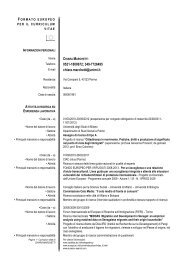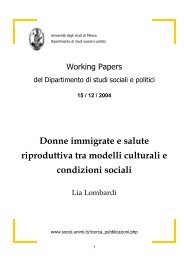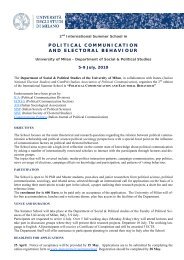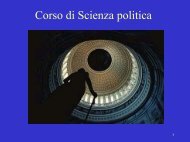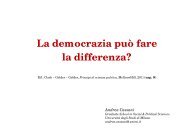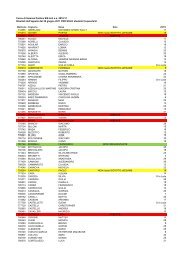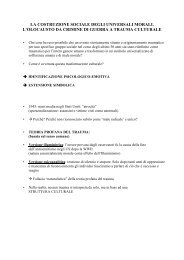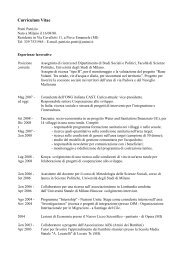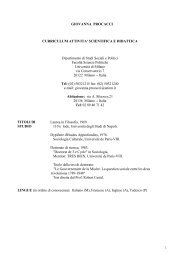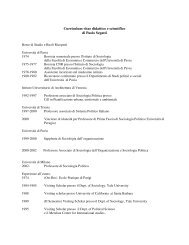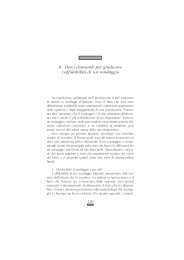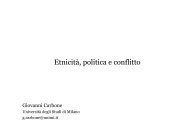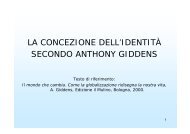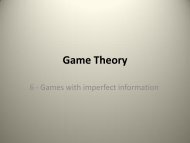The european dimension of political discourse in Italy. A ... - CIRCaP
The european dimension of political discourse in Italy. A ... - CIRCaP
The european dimension of political discourse in Italy. A ... - CIRCaP
Create successful ePaper yourself
Turn your PDF publications into a flip-book with our unique Google optimized e-Paper software.
THE EUROPEAN DIMENSION OF POLITICAL DISCOURSE IN ITALY.<br />
<strong>in</strong>ternational order, the second be<strong>in</strong>g devoted to the growth <strong>of</strong> a s<strong>in</strong>gle region, and the third<br />
be<strong>in</strong>g more persuaded <strong>of</strong> the necessity to “federate” the European entities. Before do<strong>in</strong>g that,<br />
anyway, we have to highlight a first descriptive element emerg<strong>in</strong>g from these data: the<br />
marg<strong>in</strong>al role <strong>of</strong> the European issues <strong>in</strong> the <strong>political</strong> formation <strong>of</strong> the Italian <strong>political</strong><br />
(parliamentary) class. A role that seems, anyway, to <strong>in</strong>crease <strong>in</strong> the last two generations <strong>of</strong><br />
MPs: those born after 1940 and, even more, those born after 1960 are more committed to<br />
the European issue (table 8). In other words, MPs elected dur<strong>in</strong>g the eighties and the ones<br />
arriv<strong>in</strong>g to the parliamentary scene after the crisis <strong>of</strong> 1992-1994 seem to have a more<br />
pronounced receptiveness <strong>of</strong> the problems related to European <strong>in</strong>tegration 33 .<br />
TABLE 8 ABOUT HERE<br />
Until now we did not f<strong>in</strong>d anyth<strong>in</strong>g really new, we just confirmed the mere “<strong>in</strong>direct”<br />
<strong>in</strong>volvement <strong>of</strong> domestic <strong>political</strong> elites <strong>in</strong> the debate on European <strong>in</strong>tegration (Katz 1999).<br />
Under this po<strong>in</strong>t <strong>of</strong> view, the Italian case does not seem orig<strong>in</strong>al. On the other hand, we<br />
should talk about a rather deviant case, because the Italian MPs, <strong>in</strong> the whole, appear as a<br />
strong pro-European group (look<strong>in</strong>g at their <strong>political</strong> <strong>discourse</strong>), though with no real<br />
European identity under the viewpo<strong>in</strong>t <strong>of</strong> their <strong>political</strong> experience, practice and level <strong>of</strong><br />
<strong>in</strong>formation.<br />
Controll<strong>in</strong>g the distribution <strong>of</strong> the sub-group <strong>of</strong> Europhile MPs with some other social and<br />
<strong>political</strong> variables, we can discover some <strong>in</strong>terest<strong>in</strong>g evidence that can be summarised as<br />
follows:<br />
1. dur<strong>in</strong>g the “first phase” (parliamentary recruitment between 1972 and 1983) the<br />
Europhiles were more diffuse among Christian Democrats and small government parties,<br />
while among the MPs recruited after 1983 they are more numerous among the parties <strong>of</strong> the<br />
left. <strong>The</strong> overall data about MPs from the last twenty years (table 9) show that the highest<br />
degree <strong>of</strong> European support/activism is to be found with<strong>in</strong> the left-w<strong>in</strong>g, but also the centreright<br />
and the right are more supportive than what the Christian democratic centre was able to<br />
do until about fifteen years ago.<br />
TABLE 9 ABOUT HERE<br />
2. <strong>The</strong>re is a strong correlation between pro-European attitude and non-<strong>political</strong> milieu<br />
(academics, entrepreneurs, journalists…). On the contrary, the <strong>political</strong> background, namely<br />
the pre-electoral party background, is much less pronounced <strong>in</strong> the group <strong>of</strong> the Europhiles<br />
33 This is also consistent with the thesis <strong>of</strong> a (relatively) fruitful relationship, occurred <strong>in</strong> the midseventies,<br />
between the national party elites and the pro-European and Federalist movements (Pistone<br />
2000). In fact, it is not by chance that two leaders <strong>of</strong> the “federalists” like Altiero Sp<strong>in</strong>elli and Giuseppe<br />
Petrilli were elected <strong>in</strong> parliament, respectively <strong>in</strong> 1976 and 1979 (the first as <strong>in</strong>dependent candidate<br />
by the Pci and the second by the Dc).<br />
37



